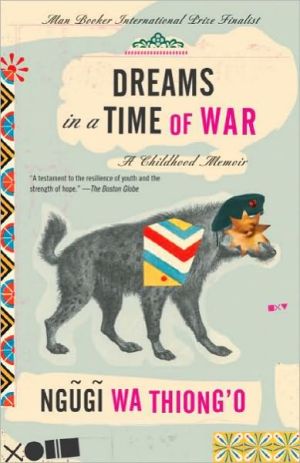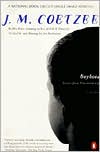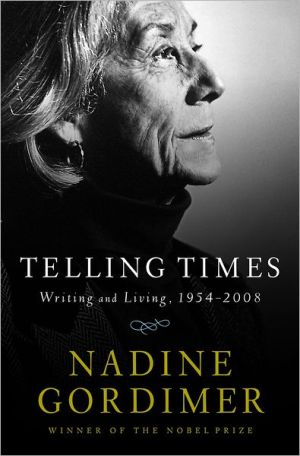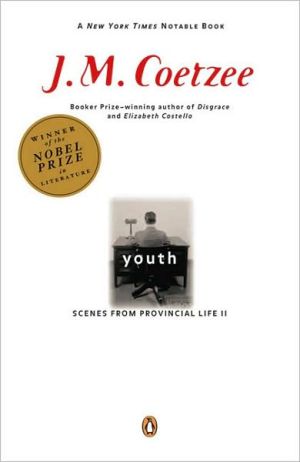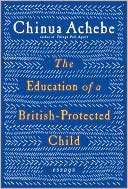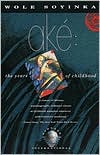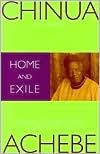Dreams in a Time of War: A Childhood Memoir
Born in 1938 in rural Kenya, Ngũgĩ wa Thiong’o came of age in the shadow of World War II, amidst the terrible bloodshed in the war between the Mau Mau and the British. The son of a man whose four wives bore him more than a score of children, young Ngũgĩ displayed what was then considered a bizarre thirst for learning, yet it was unimaginable that he would grow up to become a world-renowned novelist, playwright, and critic.\ \ In Dreams in a Time of War, Ngũgĩ deftly etches a bygone era,...
Search in google:
By the world-renowned novelist, playwright, critic, and author of Wizard of the Crow, an evocative and affecting memoir of childhood. Ngugi wa Thiong’o was born in 1938 in rural Kenya to a father whose four wives bore him more than a score of children. The man who would become one of Africa’s leading writers was the fifth child of the third wife. Even as World War II affected the lives of Africans under British colonial rule in particularly unexpected ways, Ngugi spent his childhood as very much the apple of his mother’s eye before attending school to slake what was then considered a bizarre thirst for learning. In Dreams in a Time of War, Ngugi deftly etches a bygone era, capturing the landscape, the people, and their culture; the social and political vicissitudes of life under colonialism and war; and the troubled relationship between an emerging Christianized middle class and the rural poor. And he shows how the Mau Mau armed struggle for Kenya’s independence against the British informed not only his own life but also the lives of those closest to him. Dreams in a Time of War speaks to the human right to dream even in the worst of times. It abounds in delicate and powerful subtleties and complexities that are movingly told. The Barnes & Noble Review In a life filled with an outrageous quantity of trouble, perhaps the best way to hold onto a portion of tranquility is to focus on the humble act of truth-telling. Such discipline runs throughout Ngugi wa Thiong'o's Dreams in a Time of War. The memoir's quietly straightforward demeanor goes a long way towards rending the veil of exoticism through which Westerners might otherwise view its assorted scenes of hardship, which range from female castration to the necessity of walking miles to school barefoot. Born in Kenya, in 1938, Ngugi was one of twenty-four children sired by his father, a taciturn man who had four wives, and saw his agrarian estate effectively stolen by an unscrupulous realtor manipulating new British colonial laws. The trauma inflicted by this dispossession led to the dissolution of the patriarch's self-control. To escape her husband's abusive behavior, Ngugi's mother retreated to her parents' home, where it was expected that he would eventually drift in to sue for forgiveness. This was not to be the case. Unrepentant, Ngugi's father bade him and his younger brother to go and live with their mother. With the eye of a social scientist, Ngugi situates the vicissitudes of his family's wellbeing in the larger context of the fractious political environment that surrounded his childhood. In striving to evoke the tensions that pitted traditionalists against progressives, and supporters of the colonial state against those who took up arms to overthrow it, he avoids depicting any one side as solely justified. In a roundabout way, he spells out the ethos of his book by alluding to one of his earlier works: "Years later, in my novel Weep Not, Child I would give to the young fictional Njoroge an aura of fact and rumor, certainty and doubt, despair and hope, but I am not sure if I was able truly to capture the intricate web of the mundane and the dramatic, the surreal normality of ordinary living under extraordinary times in a country at war… Perhaps it is myth as much as fact that keeps dreams alive even in times of war." The moral core of Ngugi's memoir can be found near his conclusion, "I want my actions to speak for me, positive deeds to be my only form of vengeance." One comes away from this book impressed by the author's ability to do justice to the complexity of life -- noting the inventiveness that poverty can occasion, and, in a rare incidence of practicing what one preaches, as Ngugi'cites the good deeds of his political adversaries. Dreams in a Time of War is an inspirational book deserving of a diverse readership. --Christopher Byrd
Dreams in a Time of War\ A Childhood Memoir \ \ By Ngugi wa'Thiong'o \ Pantheon\ Copyright © 2010 Ngugi wa'Thiong'o\ All right reserved.\ ISBN: 9780307378835 \ \ \ Years later when I read T. S. Eliot’s line that April was the cruelest month, I would recall what happened to me one April day 1954, in chilly Limuru, the prime estate of what, in 1902, another Eliot, Sir Charles Eliot, then governor of colonial Kenya, had set aside as White Highlands. The day came back to me, the now of it, vividly.\ \ I had not had lunch that day, and my tummy had forgotten the porridge I had gobbled that morning before the six-mile run to Kinyogori Intermediate School. Now there were the same miles to cross on my way back home; I tried not to look too far ahead to a morsel that night. My mother was pretty good at conjuring up a meal a day, but when one is hungry, it is better to find something, anything, to take one’s mind away from thoughts of food. It was what I often did at lunchtime when other kids took out the food they had brought and those who dwelt in the neighborhood went home to eat during the midday break. I would often pretend that I was going someplace, but really it was to any shade of a tree or cover of a bush, far from the other kids, just to read a book, any book, not that there were many of them, but even class notes were a welcome distraction. That day I read from the abridged version of Dickens’s Oliver Twist. There was a line drawing of Oliver Twist, a bowl in hand, looking up to a towering figure, with the caption “Please sir, can I have some more?” I identified with that question; only for me it was often directed at my mother, my sole benefactor, who always gave more whenever she could.\ \ Listening to stories and anecdotes from the other kids was also a soothing distraction, especially during the walk back home, a lesser ordeal than in the morning when we had to run barefoot to school, all the way, sweat streaming down our cheeks, to avoid tardiness and the inevitable lashes on our open palms. On the way home, except for those kids from Ndeiya or Ngeca who had to cover ten miles or more, the walk was more leisurely. It was actually better so, killing time on the road before the evening meal of uncertain regularity or chores in and around the home compound.\ \ Kenneth, my classmate, and I used to be quite good at killing time, especially as we climbed the last hill before home. Facing the sloping side, we each would kick a “ball,” mostly Sodom apples, backward above our heads up the hill. The next kick would be from where the first ball had landed, and so on, competing to beat each other to the top. It was not the easiest or fastest way of getting there, but it had the virtue of making us forget the world. But now we were too big for that kind of play. Besides, no games could beat storytelling for capturing our attention.\ \ We often crowded around whoever was telling a tale, and those who were really good at it became heroes of the moment. Sometimes, in competing for proximity to the narrator, one group would push him off the main path to one side; the other group would shove him back to the other side, the entire lot zigzagging along like sheep.\ \ This evening was no different, except for the route we took. From Kinyogori to my home village, Kwangugi or Ngamba, and its neighborhoods we normally took a path that went through a series of ridges and valleys, but when listening to a tale, one did not notice the ridge and fields of corn, potatoes, peas, and beans, each field bounded by wattle trees or hedges of kei apple and gray thorny bushes. The path eventually led to the Kihingo area, past my old elementary school, Manguo, down the valley, and then up a hill of grass and black wattle trees. But today, following, like sheep, the lead teller of tales, we took another route, slightly longer, along the fence of the Limuru Bata Shoe factory, past its stinking dump site of rubber debris and rotting hides and skins, to a junction of railway tracks and roads, one of which led to the marketplace. At the crossroads was a crowd of men and women, probably coming from market, in animated discussion. The crowd grew larger as workers from the shoe factory also stopped and joined in. One or two boys recognized some relatives in the crowd. I followed them, to listen.\ \ “He was caught red-handed,” some were saying.\ \ “Imagine, bullets in his hands. In broad daylight.”\ \ Everybody, even we children, knew that for an African to be caught with bullets or empty shells was treason; he would be dubbed a terrorist, and his hanging by the rope was the only outcome.\ \ “We could hear gunfire,” some were saying.\ \ “I saw them shoot at him with my own eyes.”\ \ “But he didn’t die!”\ \ “Die? Hmm! Bullets flew at those who were shooting.”\ \ “No, he flew into the sky and disappeared in the clouds.”\ \ Disagreements among the storytellers broke the crowd into smaller groups of threes, fours, and fives around a narrator with his own perspective on what had taken place that afternoon. I found myself moving from one group to another, gleaning bits here and there. Gradually I pieced together strands of the story, and a narrative of what bound the crowd emerged, a riveting tale about a nameless man who had been arrested near the Indian shops.\ \ The shops were built on the ridge, rows of buildings that faced each other, making for a huge rectangular enclosure for carriages and shoppers, with entrance-exits at the corners. The ridge sloped down to a plain where stood African-owned buildings, again built to form a similar rectangle, the enclosed space often used as a market on Wednesdays and Saturdays. The goats and sheep for sale on the same two market days were tethered in groups in the large sloping space between the two sets of shopping centers. That area had apparently been the theater of action that now animated the group of narrators and listeners. They all agreed that after handcuffing the man, the police put him in the back of their truck.\ \ Suddenly, the man had jumped out and run. Caught unawares, the police turned the truck around and chased the man, their guns aimed at him. Some of them jumped out and pursued him on foot. He mingled with shoppers and then ran through a gap between two shops into the open space between the Indian and African shops. Here, the police opened fire. The man would fall, but only to rise again and run from side to side. Time and again this had happened, ending only with the man’s zigzagging his way through the herds of sheep and goats, down the slopes, past the African shops, across the rails, to the other side, past the crowded workers’ quarters of the Limuru Bata Shoe Company, up the ridge till he disappeared, apparently unharmed, into the European-owned lush green tea plantations. The chase had turned the hunted, a man without a name, into an instant legend, inspiring numerous tales of heroism and magic among those who had witnessed the event and others who had received the story secondhand.\ \ I had heard similar stories about Mau Mau guerrilla fighters, Dedan Kimathi in particular; only, until then, the magic had happened far away in Nyandarwa and the Mount Kenya mountains, and the tales were never told by anybody who had been an eyewitness. Even my friend Ngandi, the most informed teller of tales, never said that he had actually seen any of the actions he described so graphically. I love listening more than telling, but this was the one story I was eager to tell, before or after the meal. Next time I met Ngandi, I could maybe hold my own.\ \ The X-shaped barriers to the railway crossing level were raised. A siren sounded, and the train passed by, a reminder to the crowd that they still had miles to go. Kenneth and I followed suit, and when no longer in the company of the other students he spoiled the mood by contesting the veracity of the story, at least the manner in which it had been told. Kenneth liked a clear line between fact and fiction; he did not relish the two mixed. Near his place, we parted without having agreed on the degree of exaggeration.\ \ Home at last, to my mother, Wanjiku, and my younger brother, Njinju, my sister Njoki, and my elder brother’s wife, Charity. They were huddled together around the fireside. Despite Kenneth, I was still giddy with the story of the man without a name, like one of those characters in books. Sudden pangs of hunger brought me back to earth. But it was past dusk, and that meant an evening meal might soon be served.\ \ Food was ready all right, handed to me in a calabash bowl, in total silence. Even my younger brother, who liked to call out my failings, such as my coming home after dusk, was quiet. I wanted to explain why I was late, but first I had to quell the rumbling in my tummy.\ \ In the end, my explanation was not necessary. My mother broke the silence. Wallace Mwangi, my elder brother, Good Wallace as he was popularly known, had earlier that afternoon narrowly escaped death. We pray for his safety in the mountains. It is this war, she said. \ \ Continues... \ \ \ \ Excerpted from Dreams in a Time of War by Ngugi wa'Thiong'o Copyright © 2010 by Ngugi wa'Thiong'o. Excerpted by permission.\ All rights reserved. No part of this excerpt may be reproduced or reprinted without permission in writing from the publisher.\ Excerpts are provided by Dial-A-Book Inc. solely for the personal use of visitors to this web site. \ \
\ Marie Arana…the chronicle of a child's single-minded pursuit of an education…Ngugi's memoir is not about the world adults had made. Dreams in a Time of War hews to the promise the boy made his mother. Young Ngugi carries on his studies, despite all possible adversity. He marches off to school, takes joy in his ability to read, memorizes poetry, sits at the front of every classroom. The picture of Kenya that he presents, in other words, is admirably free of cant or sentimentality, and yet it is enough to make you weep. Here is a child, against the backdrop of a terrible war—traveling a bloodied land with pen and paper—thinking a dream can forge a better world.\ —The Washington Post\ \ \ \ \ Kirkus ReviewsIt takes a village to raise a writer. Against improbable odds, a Kenyan village raised a superb one in wa Thiong'o (English and Comparative Literature/Univ. of California, Irvine; Something Torn and New: An African Renaissance, 2009, etc.). Thanks to books by Ishmael Beah, Joseph Sebarenzi and others, readers outside Africa have a good sense of the face of modern wars on the continent. Firsthand accounts of colonial-era conflicts are fewer, which makes the author's memoir of the Mau-Mau conflict against British rule in Kenya all the more valuable. His book opens in 1954, with hunger: "I had not had lunch that day," he writes, "and my tummy had forgotten the porridge I had gobbled that morning before the six-mile run to . . . school." When the other children unwrapped their lunches or went home for a midday meal, the author retreated into the shade to read a book, "any book, not that there were many of them, but even class notes were a welcome distraction." The young man also had to reckon with the political consequences of having a brother who disappeared into the mountains, ghostlike, to fight the colonists. He did, however, have a healthy support system, the result of living in a household of multiple wives and many half-siblings and cousins-to say nothing of a mother who, among other things, saved him from carbon monoxide poisoning. Against this affectionate anarchy, wa Thiong'o juxtaposes encounters with colonial administrators, bureaucrats who insisted that a young native such as he use the lordly address effendi. When he did not and received a rain of blows as a consequence, readers will instantly comprehend why other young men are fighting a guerrilla war against theirtormentors-and why the author's winning of a scholarship to high school was such a triumph for himself and his family. Evenhanded, evocative account of distant times and places-a strong contribution to both the literature of colonialism and modern African literature in English.\ \ \ Publishers WeeklyCelebrated African author and activist Thiong'o tells no ordinary coming-of-age tale. The fifth child of his father's third wife—one of an extended family whose collective experiences range from rural farming and carpentry to WWII rifleman—Ngugi skillfully recounts the challenges and calamities of growing up in British-occupied Kenya. Born in 1938, he recalls a boyhood framed by his pursuit of education (he had a unspoken pact with his mother to always do his best) and by his developing awareness of nationalist politics. Through teachers and local storytellers he hears of such world figures as Winston Churchill, Jomo Kenyatta, and Jesse Owens; at home he eventually discovers that within his own family there are both Mau Mau rebels and colonial sympathizers. Tensions between tradition and modernity, a theme Ngugi explored in his first novel, 1964's Weep Not Child), become apparent in his fascination with the Old Testament and Christianity, and his fear when he is interrogated by military authorities. For readers, sequential time surrenders to a sense of narrative and an engaging humanity. (May)\ \ \ \ \ The Barnes & Noble ReviewIn a life filled with an outrageous quantity of trouble, perhaps the best way to hold onto a portion of tranquility is to focus on the humble act of truth-telling. Such discipline runs throughout Ngugi wa Thiong'o's Dreams in a Time of War. The memoir's quietly straightforward demeanor goes a long way towards rending the veil of exoticism through which Westerners might otherwise view its assorted scenes of hardship, which range from female castration to the necessity of walking miles to school barefoot.\ Born in Kenya, in 1938, Ngugi was one of twenty-four children sired by his father, a taciturn man who had four wives, and saw his agrarian estate effectively stolen by an unscrupulous realtor manipulating new British colonial laws. The trauma inflicted by this dispossession led to the dissolution of the patriarch's self-control. To escape her husband's abusive behavior, Ngugi's mother retreated to her parents' home, where it was expected that he would eventually drift in to sue for forgiveness. This was not to be the case. Unrepentant, Ngugi's father bade him and his younger brother to go and live with their mother.\ With the eye of a social scientist, Ngugi situates the vicissitudes of his family's wellbeing in the larger context of the fractious political environment that surrounded his childhood. In striving to evoke the tensions that pitted traditionalists against progressives, and supporters of the colonial state against those who took up arms to overthrow it, he avoids depicting any one side as solely justified. In a roundabout way, he spells out the ethos of his book by alluding to one of his earlier works: "Years later, in my novel Weep Not, Child I would give to the young fictional Njoroge an aura of fact and rumor, certainty and doubt, despair and hope, but I am not sure if I was able truly to capture the intricate web of the mundane and the dramatic, the surreal normality of ordinary living under extraordinary times in a country at war… Perhaps it is myth as much as fact that keeps dreams alive even in times of war."\ The moral core of Ngugi's memoir can be found near his conclusion, "I want my actions to speak for me, positive deeds to be my only form of vengeance." One comes away from this book impressed by the author's ability to do justice to the complexity of life -- noting the inventiveness that poverty can occasion, and, in a rare incidence of practicing what one preaches, as Ngugi'cites the good deeds of his political adversaries. Dreams in a Time of War is an inspirational book deserving of a diverse readership.\ --Christopher Byrd\ \ \
